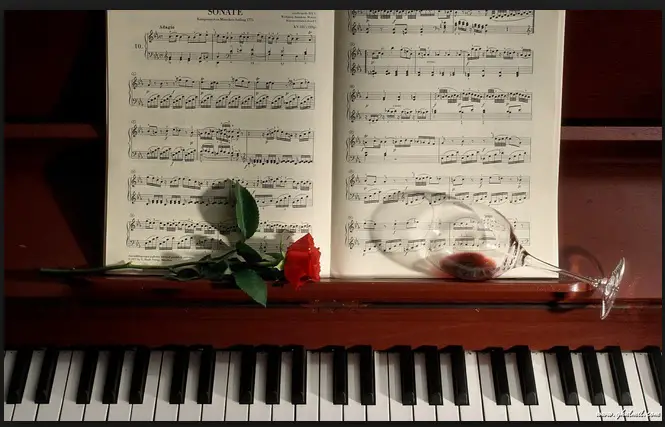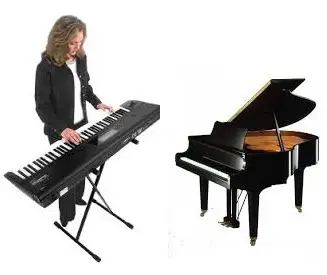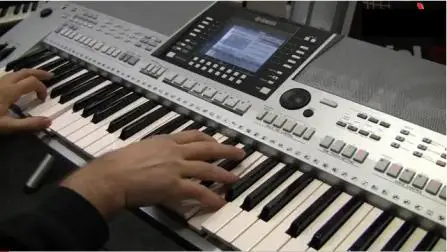
Keyboard Lessons vs Piano Lessons: Is it possible to learn to play the piano on an electronic Keyboard? Will it ruin your technique in the long run? Is there any difference between learning to play the keyboard and learning to play the piano? All your queries anwered here. Also find easy keyboard lessons to help you get started on the electronic piano keyboard.
When you decide to learn to play a musical instrument, the first thing you need to do is to buy an instrument on which you can learn and practice. It means you have to first buy a piano!
But the problem is that most pianos are expensive, are huge in size, and if you buy an acoustic one, then you’ll also have to worry about its maintenance.
A good alternative is to look for the digital version. Though its a great alternative for a beginner, even the good digital pianos can be expensive and occupy lot of place.
So how about learning to play on a keyboard – the electronic keyboard (also known as arrangers)? Will it serve the purpose?
It depends on what you want to learn to play!
Difference Between Keyboard and Piano
So is there are any difference between the keyboard and the piano?
Of course there is. The electronic keyboard/digital piano uses electronics to produce the sounds, whereas the acoustic piano uses a complex mechanism using strings, hammers (and a lot more) to produce the sound.
Having said that, as a beginner piano/keyboard student, you only have to know the basic differences such as:
- A piano has fully weighted keys. While the weighted keys may seem uncomfortable to the beginner initially (compared to the keys on a keyboard), the weighted keys actually makes it easier to play classical/complex pieces on the piano. Beginners will need to get used to the weighted keys by regular practicing, which will build their hand/finger strength.

Advantages of Keyboard
If you don’t have any preferences in terms of the genres/styles of music you like, are learning for fun, then its perfectly alright to start on a keyboard.
The notes would still remain the same, the scales and the chords will have to be played exactly the way you play on a piano.
Besides, all the features, effects, voices and styles are fun to use on a keyboard. Most beginners actually love to play on a keyboard. Its only later on, as they become more knowledgeable, that many are drawn towards the piano.
Its a great instrument to get an overall understanding of music, how its created and even recorded. Most keyboards come with on-board sequencer where you can actually record tracks similar to how its done in a studio.
So its a great learning experience!
Advantages of Piano
However, if you’re keen to play classical piano, then the keyboard will have limitations.
First of all, it has 61 keys, which is not sufficient for most classical pieces.
Secondly, the keys are not weighted as on a piano, which makes it difficult to play certain pieces (with certain dynamics & expressions).
But even there, you won’t be rushing directly to the songs; you’ll still need to learn the basics which can easily take a few months time.
So if budget is a constraint, by all means go ahead and learn to play piano on a Keyboard. But if you really want to play piano, and are okay to spend more, get a piano with 88 weighted keys.
Keyboard vs Piano Lessons: Basics Remain the Same
What what about learning? Do you think keyboard lessons are the same as piano lessons or is there any difference?
At the basic level, it will not make much of a difference if you begin learning on any keyboard instrument.
And that’s what many do. they start out on keyboard (due to the cost) and switch to the piano later. Most students get more clarity about what they like and dislike after a few months (some take even a couple of years) of lessons.
So assuming you already have a 61-key keyboard, or don’t have the budget to buy a piano right now, you can use the keyboard to learn piano for few months.
- Learn the basis of sight reading
- Learn to coordinate both the hands
- Learn to play simple classical pieces
- Get a full size piano (if you really want to play the piano)
Those who graduate from the music keyboard to the piano have a head start because they already understand the “keyboard layout”, can sight read (to some extent), and have better coordination between the hands.
So if you’re very clear that you want to learn piano (Beethoven, Bach, and other classics) get a proper piano after some time; the keys on a keyboard are far too light and there are only 61 keys.
A lot of people still think that acoustic instruments are better than digital. However, that is no longer the case, you get great digital pianos for around a couple of thousand dollars that look, feel and sound like real pianos (almost).
What About the Playing Techniques?
While the basics may remain the same, keyboard and piano require different playing techniques.
While playing keyboards, you play songs on top of the accompaniment, so your focus is to play the right melody notes and maintain the time. You use the left hand to play blocks chords to keep the accompaniment section moving.
This is how most beginner keyboard players would play.
But once you’re past the beginner’s stage, keyboard players should put in the efforts to learn more accompaniment techniques, so that they can accompany even when the backing track is off, which will help them play in a band and with other musicians. Read more here on learn how to play the electronic music keyboards
So to all the keyboard players out there, do buy books on how to play electronic keyboards to get started. But also buy beginner piano books (for example the Kenneth Baker piano books) and learn from them; it will train your left hand better. Even if you decide to begin with learning to play the keyboards, it is recommended that you eventually learn to play the piano as well, that is play in a piano style where you are able to accompany using your left hand.

Know What You Enjoy Playing
Not to offend anyone, but a lot of piano teachers give undue importance to classical music, are trained only in classical, can only play if they have sheet music in front of them. They hardly have any exposure to other musical styles, and usually have trouble playing by ear (on the fly). Most of them are likely to suggest you that acoustic piano is better and that you have to play only classical.
However, that’s not the entire truth.
There are teachers out there who can teach you a bit of all styles (their characteristics), music theory, techniques on a digital piano.
So if you have a midi keyboard that you use for music creation and just want to acquire more skills, especially with the left hand, I would suggest you continue learning on your existing keyboard, unless you really feel that you should get a piano (digital or acoustic) want fully weighted keys.
Learning to Play the Piano
Students who learn to play the piano will use their left hand quite a lot, right from the beginning, in order to provide the accompaniment. You will also learn a lot of classical as part of your pedagogy.
A full sized piano will let you play pieces by master composers such as Bach, Scarlatti, Haydn, Mozart, Beethoven, Chopin – including quite a few of the etudes.
Have you always wanted to play the keyboards but could never get the time to learn it? Getting a piano software program could help you get started quickly. Most beginning courses would take you through more or less similar steps, but a piano learning course will demand more out of your left hand and teach you many more playing techniques. Checkout the best piano learning software here…
Final Thoughts
Whatever is the style of music that interests you – jazz, blues, classical, you could learn it on a piano or a keyboard (for classical, you will need 88, weighted keys). With so many designs of keyboards available, its easy to pick one that will suit your needs. In general, start with an inexpensive keyboard to learn the ropes, and upgrade to a better keyboard/piano with more keys, features and better keyboard action.
Once you have the instrument sorted out, look for a piano teacher that specializes in the instrument and style of music you wish to .
Back to Home page from Keyboard Lessons vs piano lessons
KeytarHQ editorial team includes musicians who write and review products for pianists, keyboardists, guitarists & other musicians. KeytarHQ is the best online resource for information on keyboards, pianos, synths, keytars, guitars and music gear for musicians of all abilities, ages and interests.



Get started on a decent music keyboard, the skills can be transitioned to a full weighted piano (acoustic or digital). The transition to a piano with weighted keys is a but harder earlier on, but easily achievable. And mind you, the feel of the keys differ even from piano to piano. For instance, a Steinway feels different from a Yamaha piano. So if you practice on the acoustic piano at home, its no guarantee that you feel comfortable on the piano at the exam center / performance venue.
Also, the tone of the piano doesn’t matter much in the beginning. As a beginner, you should focus on learning how to play, where to place your fingers, how to make songs, learn music theory, etc.
Having said that, weighted keyboard is a better option, if you can afford one as your first keyboard. It’s hard to go from unweighted to weighted, but easier to go from weighted to unweighted.